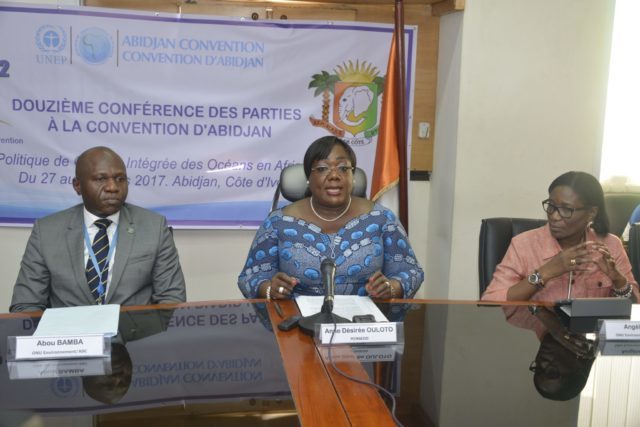A nine-year revitalisation process for the Convention for Cooperation in the Protection, Management and Development of the Marine and Coastal Environment of the Atlantic Coast of the West, Central and Southern Africa Region (otherwise known as the Abidjan Convention) will effectively come to an end in a couple of weeks’ time.

At the 12th Conference of the Contracting Parties (COP12) to the Abidjan Convention scheduled to hold from Monday, March 27 to Friday March 31 2017 in Abidjan, Côte d’Ivoire, the Convention’s active phase will henceforth become operational.
With the theme “Integrated oceans management policies in Africa”, COP12 will in short ensure the commencement of the implementation of the Convention and its protocols.
Indeed, the event’s importance was highlighted by the Government of Côte d’Ivoire and the United Nations Environment Programme (UNEP) at a media session in Abidjan on Thursday, March 9 2017.
“Abidjan is set to become the epicentre of the debate on the Southeast Atlantic Ocean and adjoining coastal areas when Parties to the Abidjan Convention meet for their 12th Conference, which is a major event in the life of the Convention,” noted the Convention’s Executive Secretary, Abou Bamba. “It will mark the end of the Convention’s revitalisation phase. You could say that it will signal a new start, a new take-off.”
Côte d’Ivoire’s Minister of Sanitation, Environment and Sustainable Development, Anne Désirée Ouloto, stressed that “the Abidjan Convention is vitally important to Côte d’Ivoire”.
“It is in Abidjan that the convention was signed 36 years ago,” she recalled. “It is here that its headquarters is located; but, above all, the themes it refers to are extremely relevant to Côte d’Ivoire and its people,” she added, highlighting issues such as coastal erosion and land-based pollution, while encouraging the media to play their part in educating the public and raising its awareness on issues related to the marine and coastal environment.
Both the Executive Secretary of the Convention, whose secretariat is provided by UN Environment (UNEP), and the Environment Minister stressed that the marine and coastal environment does not only present challenges, but also offers opportunities. Citing the example of the hundreds of kilometers of lagoons in Côte d’Ivoire – which are being cleaned under an ongoing sanitation plan – they urged the young people in particular to take advantage of the economic prospects that the sustainable use of this type of natural coastal resources can offer.
Ratified in 1984, the Abidjan Convention covers a geographic area that comprises 22 countries, 19 of which have already ratified it. According to UNEP, it constitutes a unique institutional referential framework for all initiatives linked to the protection and conservation of the marine and coastal environment along Africa’s Atlantic seaboard, and to the sustainable development of the area’s resources.
A revitalisation process that began in 2008 has, besides the transfer of the Convention’s headquarters from Nairobi to Abidjan, seen the updating of its fundamental texts as well as the strengthening of collaboration with an increased number of partners.
The Conference of Parties (COP), the Convention’s highest decision-making body, meets every two to three years. Its 12th edition, according to the organisers, will bring together participants from the world over, including scientists and representatives of inter-governmental organisations, United Nations agencies and environmental NGOs, in addition to the delegations representing the Parties.
“It will also be attended by representatives of communities affected by the various phenomena – including coastal erosion, unplanned coastal urbanisation and marine pollution – and in some cases involved in the search for solutions,” disclosed Mr Bamba.
The Conference will begin with an expert segment from 27 to 29 March, followed by the ministerial conference on 30 and 31 March.
Parallel to the official discussions, there will be debates on specific themes such as aquatic wild meat, coastal erosion, lagoons, oil and gas, clean energy and the blue economy, as well as exhibition stands in which organisations and institutions will present their activities to the public.
